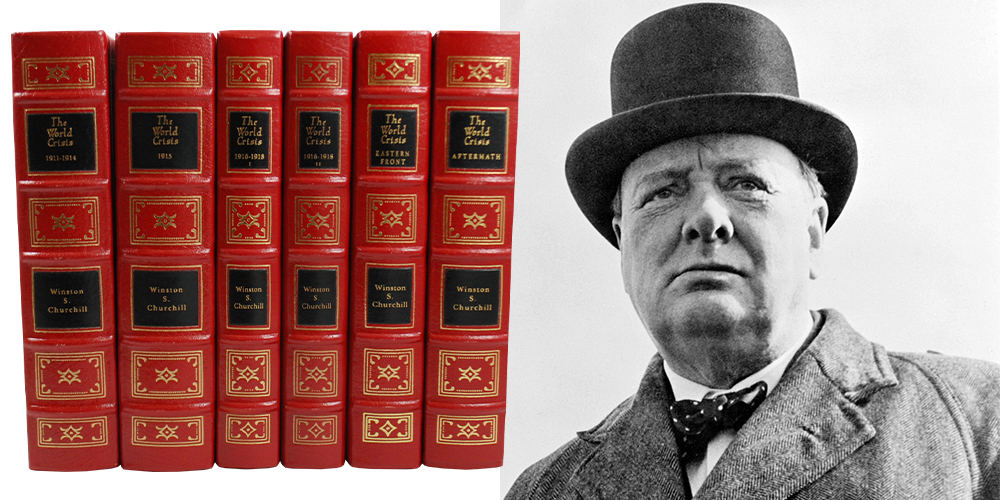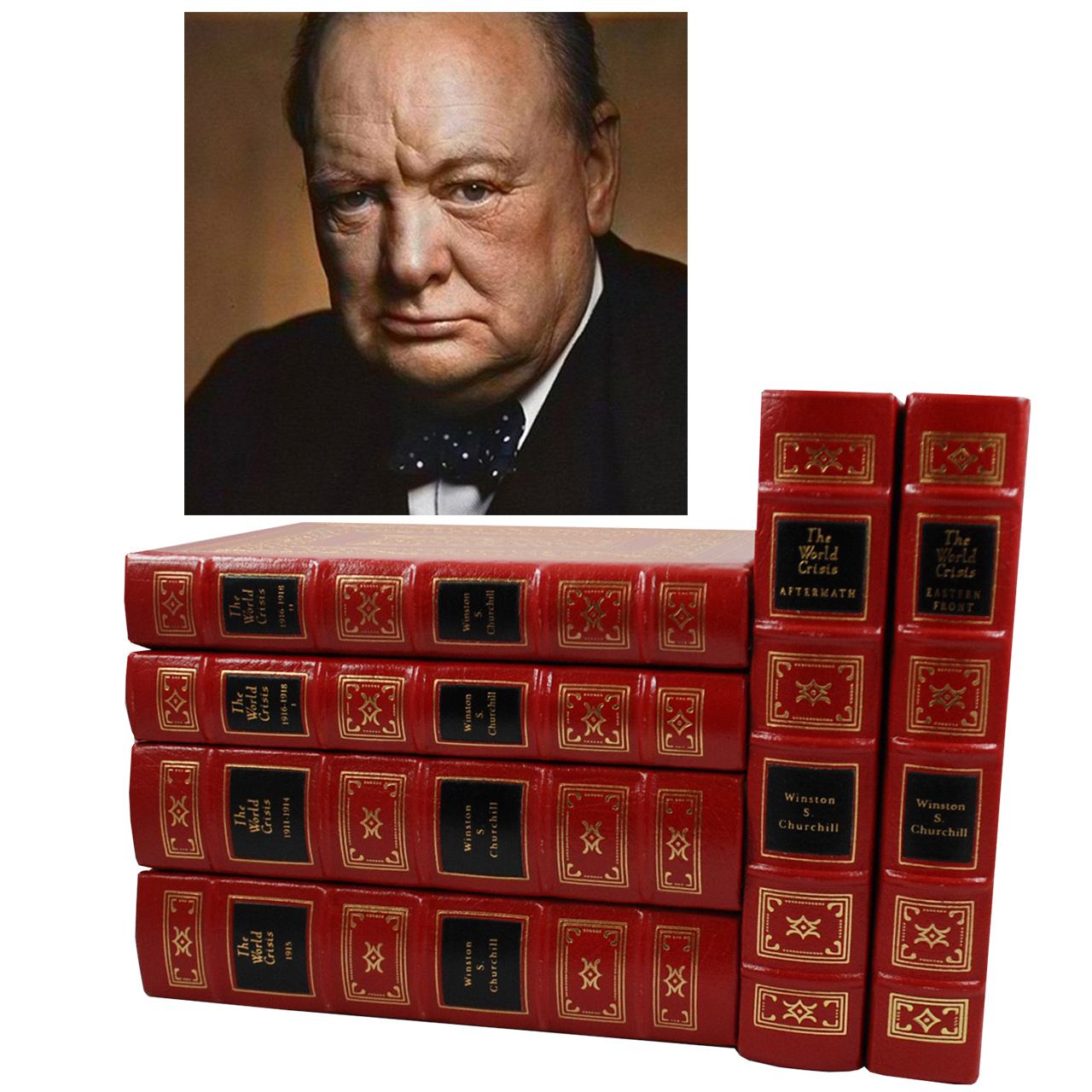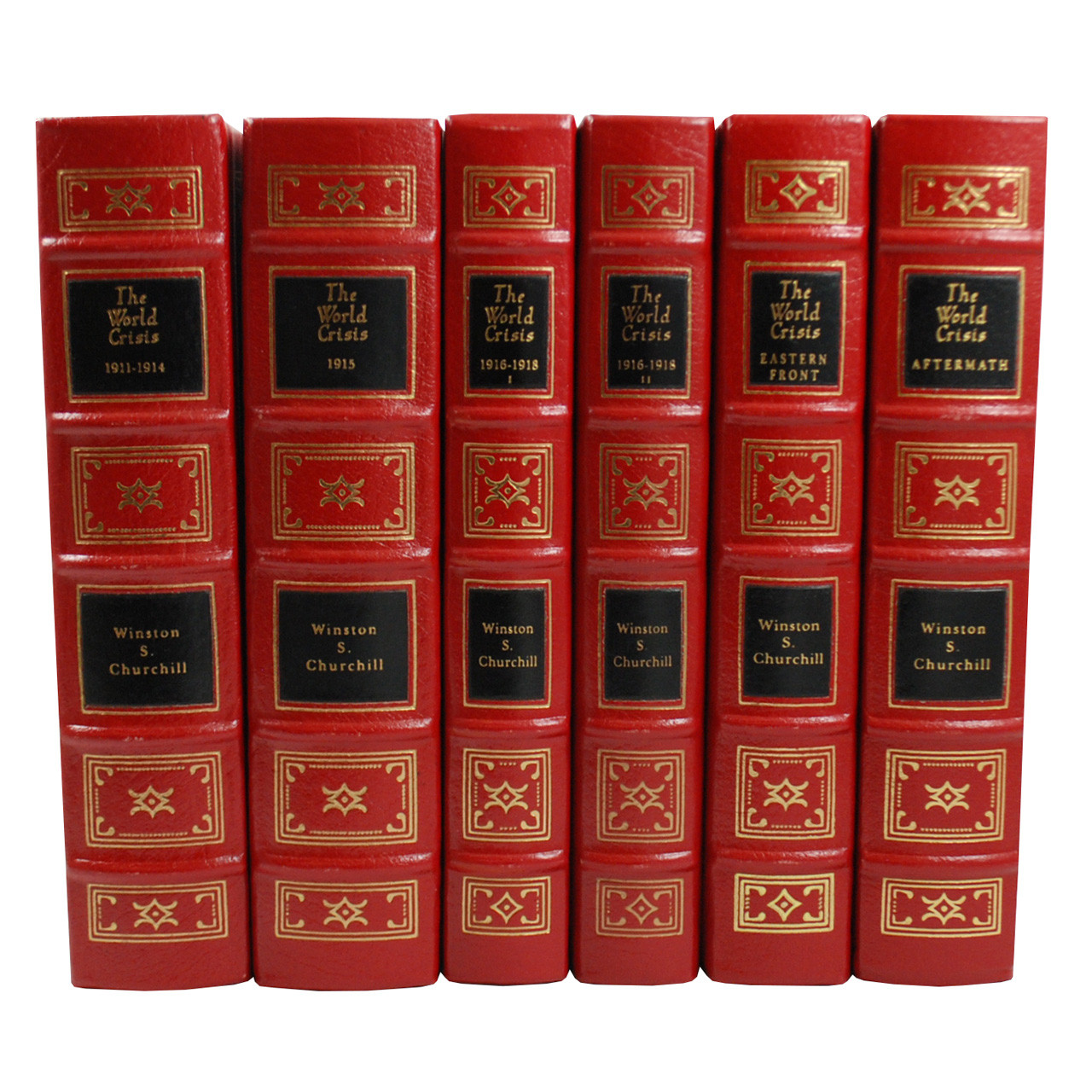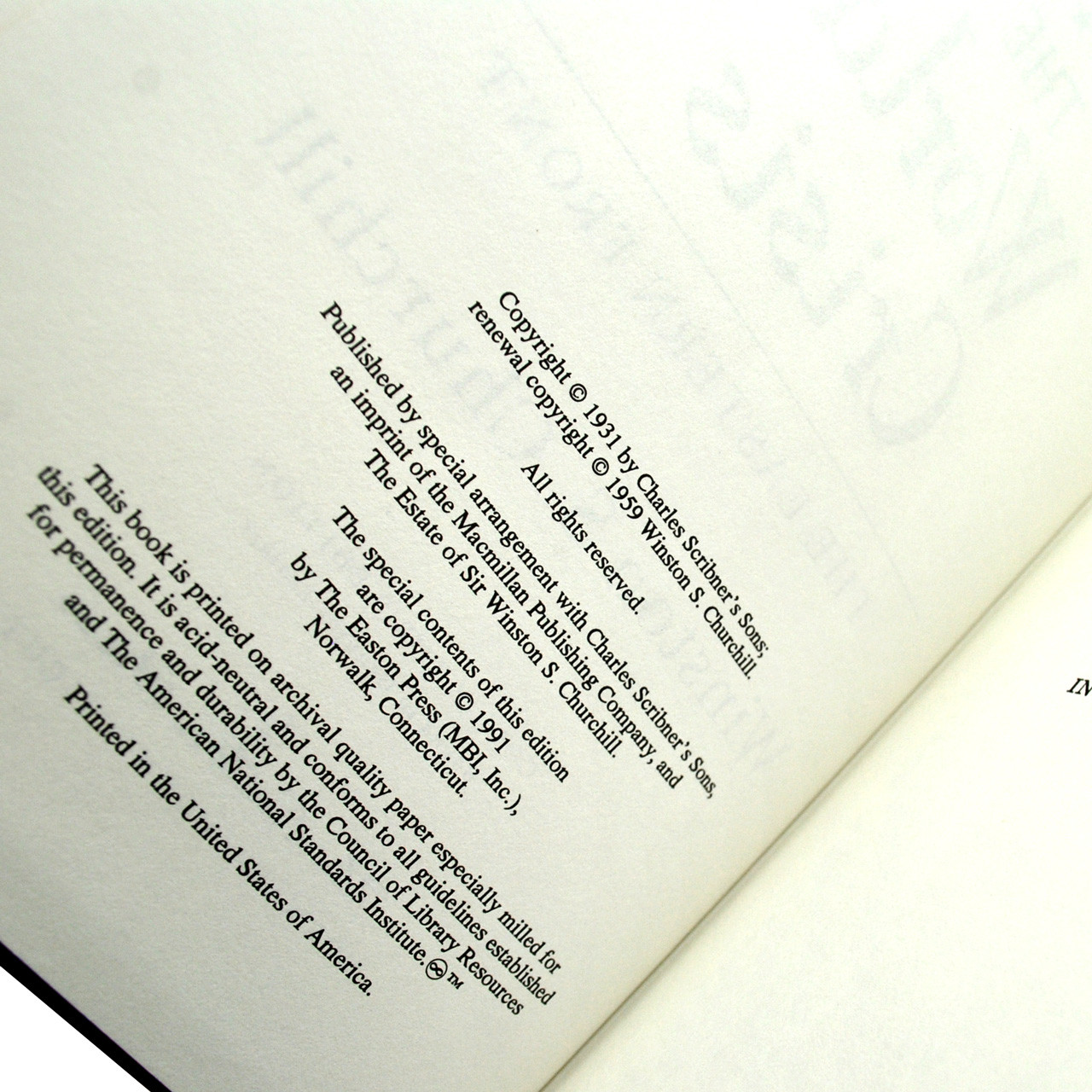A Leather-bound collector's set by Winston Churchill, one of the greatest statesmen of our time and winner of the Nobel Prize for Literature

Easton Press. Norwalk, CT. 1991. Winston S. Churchill "The First World War: The World Crisis". Complete matching 6 volume leather bound set. Full genuine leather with numerous maps and photos. Black title & author labels on the spine. A distinguished set that is now OUT OF PRINT.
Winston Churchill was a British politician, best known for his leadership of the United Kingdom during the Second World War. He is widely regarded as one of the great wartime leaders of the 20th century, and he was also a writer. Churchill is the only British prime minister who has received the Nobel Prize in Literature.
List of titles, complete in 6 volumes:
- Volume I - 1911-1914 [Very Fine, unread book with square and tight spine]
- Volume II - 1915 [Very Fine - with short superficial mark to the gilded page edge]
- Volume III - 1916-1918: I [Very Fine, unread book with square and tight spine]
- Volumes IV - 1916-1918: II [Very Fine, unread book with square and tight spine]
- Volume V - The Eastern Front [Very Fine, unread book with square and tight spine]
- Volume VI - Aftermath [Very Fine, unread book with square and tight spine]
About Winston Churchill
Sir Winston Leonard Spencer Churchill,[a] KG, OM, CH, TD, DL, FRS, RA (30 November 1874 – 24 January 1965) was a British statesman, soldier and writer who served as Prime Minister of the United Kingdom from 1940 to 1945, during the Second World War, and again from 1951 to 1955. Apart from two years between 1922 and 1924, he was a Member of Parliament (MP) from 1900 to 1964 and represented a total of five constituencies. Ideologically an economic liberal and imperialist, he was for most of his career a member of the Conservative Party, which he led from 1940 to 1955. He was a member of the Liberal Party from 1904 to 1924.
Of mixed English and American parentage, Churchill was born in Oxfordshire to a wealthy, aristocratic family. He joined the British Army in 1895 and saw action in British India, the Anglo-Sudan War, and the Second Boer War, gaining fame as a war correspondent and writing books about his campaigns. Elected a Conservative MP in 1900, he defected to the Liberals in 1904. In H. H. Asquith's Liberal government, Churchill served as President of the Board of Trade and Home Secretary, championing prison reform and workers' social security. As First Lord of the Admiralty during the First World War, he oversaw the Gallipoli Campaign but, after it proved a disaster, he was demoted to Chancellor of the Duchy of Lancaster. He resigned in November 1915 and joined the Royal Scots Fusiliers on the Western Front for six months. In 1917, he returned to government under David Lloyd George and served successively as Minister of Munitions, Secretary of State for War, Secretary of State for Air, and Secretary of State for the Colonies, overseeing the Anglo-Irish Treaty and British foreign policy in the Middle East. After two years out of Parliament, he served as Chancellor of the Exchequer in Stanley Baldwin's Conservative government, returning the pound sterling in 1925 to the gold standard at its pre-war parity, a move widely seen as creating deflationary pressure and depressing the UK economy.
Out of government during his so-called "wilderness years" in the 1930s, Churchill took the lead in calling for British rearmament to counter the growing threat of militarism in Nazi Germany. At the outbreak of the Second World War he was re-appointed First Lord of the Admiralty. In May 1940, he became Prime Minister, replacing Neville Chamberlain. Churchill formed a national government and oversaw British involvement in the Allied war effort against the Axis powers, resulting in victory in 1945. After the Conservatives' defeat in the 1945 general election, he became Leader of the Opposition. Amid the developing Cold War with the Soviet Union, he publicly warned of an "iron curtain" of Soviet influence in Europe and promoted European unity. He lost the 1950 election, but was returned to office in 1951. His second term was preoccupied with foreign affairs, especially Anglo-American relations and the preservation of the British Empire. Domestically, his government emphasised house-building and completed the development of a nuclear weapon (begun by his predecessor). In declining health, Churchill resigned as Prime Minister in 1955, although he remained an MP until 1964. Upon his death in 1965, he was given a state funeral.
Widely considered one of the 20th century's most significant figures, Churchill remains popular in the UK and Western world, where he is seen as a victorious wartime leader who played an important role in defending Europe's liberal democracy against the spread of fascism. He is also praised as a social reformer. He has, however, been criticised for some wartime events and also for his imperialist views. As a writer, Churchill was awarded the Nobel Prize for Literature in 1953 for his historical and biographical work. He was also a prolific painter.
Features
Includes all the classic Easton Press qualities:
* Premium Leather
* Silk Moire Endleaves
* Distinctive Cover Design
* Hubbed Spine, Accented in Real 22KT Gold
* Satin Ribbon Page Marker
* Gilded Page Edges
* Long-lasting, High Quality Acid-neutral Paper
* Smyth-sewn Pages for Strength and Durability
* Beautiful Illustrations

- Publisher:
- Easton Press
- Edition:
- Limited Edition
- Binding:
- Full Genuine Leather
- Author:
- Winston Churchill



























![Easton Press, John Keegan, "The First World War" and "The Second World War" Signed Limited Collector's Edition, Leather Bound Matching Set [Very Fine] Easton Press, John Keegan, "The First World War" and "The Second World War" Signed Limited Collector's Edition, Leather Bound Matching Set [Very Fine]](https://cdn11.bigcommerce.com/s-eohzfjch7f/images/stencil/500x659/products/720/2686/44-118-2__35358.1601670558.jpg?c=1)

![Easton Press "Great Battles" 4-Volume Complete Matching Limited Edition Collector's Set, Leather Bound [Sealed] Easton Press "Great Battles" 4-Volume Complete Matching Limited Edition Collector's Set, Leather Bound [Sealed]](https://cdn11.bigcommerce.com/s-eohzfjch7f/images/stencil/500x659/products/747/2824/44-148-2__40624.1601670594.jpg?c=1)

![Easton Press, James R. Newman "The World of Mathematics" Leather Bound Limited Edition, Complete Matching 4-Vol. Set [Sealed] Easton Press, James R. Newman "The World of Mathematics" Leather Bound Limited Edition, Complete Matching 4-Vol. Set [Sealed]](https://cdn11.bigcommerce.com/s-eohzfjch7f/images/stencil/500x659/products/738/2768/44-136-2__77257.1601670580.jpg?c=1)

